- Home
- Margaret Pemberton
The Londoners Page 8
The Londoners Read online
Page 8
‘I’m not sure that the Sudetenland is inhabited mainly by Germans,’ Kate said, mindful of her many conversations on the subject with her father. ‘There are Czechs and Slovaks and Hungarians and Ruthenes living there as well.’
‘Ruthenes?’ Mr Muff asked with mild interest as he returned to his desk. ‘What are Ruthenes? Are they members of a religious sect?’
‘They’re Slavs,’ Kate said, trying to keep impatience from her voice and wondering if Mr Chamberlain was similarly ignorant. ‘And no-one seems to have asked what will happen to them now the Sudetenland has been ceded to a fascist state.’
‘I’m sure everything will work out quite satisfactorily,’ Mr Muff said, too vastly relieved by the promise of peace for his own country to worry overmuch about the fate of a people he had, until that moment, been ignorant of.
‘And there will be Jews in the Sudetenland,’ Kate added, refusing to let him off the hook. ‘What will happen to them now?’
Mr Muff didn’t know, and if the answer was one which would keep him awake at night, neither did he want to know.
‘There’s a lot of post this morning,’ he said, clinging determinedly to the cheerfulness he had felt ever since he had heard the BBC report of the Munich Peace Agreement. ‘We’d better make a start on it. Onward and upward.’
Kate had brought a packed lunch to work and at lunchtime she walked down towards the river. Sitting on a conveniently sited bench a little down-river from Greenwich Pier, she gazed out over the iron-grey surface of the Thames and wondered why it was that a man as essentially kind and decent as Mr Muff should be unable to see the Munich Peace Agreement for what it truly was; an obscene sell-out to Hitler.
The river was thick with shipping. Tugs and lighters, gunnel-deep with crates and bales destined for the wharves and warehouses of Bermondsey and Rotherhithe, vied for shipping space with barges and an occasional paddle-steamer.
Kate took her sandwiches out of her shoulder bag and opened them, wondering where the larger ships had come from and where they were going; wondering if any of them were still trading with Germany.
‘A penny for them,’ a voice she would have recognized anywhere said, his shadow falling over her.
Her heart began to beat in sharp, slamming little strokes that she could feel even in her finger-tips. Ever since her initial meeting with him he had been working with Mr Tutley in Planning and Design and she had seen him only at a distance. From a distance she had, however, been acutely aware of him and she had become convinced that her revised opinion of him was correct. He hadn’t intentionally meant to disconcert either her or Mr Muff. He was simply unorthodox in that he treated everyone, from senior management to cleaning staff, in the same direct and friendly manner.
As he sat down beside her, she said truthfully, ‘I was wondering where all the ships come from and go to and I was thinking that it must be very nice to be a sailor, especially if being a sailor means not having to endure newsreels of Mr Chamberlain waving his wretched piece of paper in the air and being congratulated for having achieved peace at Czechoslovakia’s expense.’
‘Do you think he has achieved peace?’ Toby asked, helping himself, uninvited, to one of her cheese and tomato sandwiches.
To her amazement she felt her heartbeats steady and her tummy muscles relax. It was suddenly as if she was talking to someone she had known for a long time; someone with whom she was completely at ease.
‘No,’ she said with stark frankness. ‘Do you?’
‘No,’ he said, as she had known he would. ‘It’s a cop-out. However loudly Hitler shouts that Czechoslovakia is his last territorial demand, no-one with any sense believes him.’ He stretched his long legs out in front of him. ‘Duff Cooper certainly doesn’t believe him. It wouldn’t surprise me if he didn’t resign his position as First Lord of the Admiralty. And Anthony Eden and Winston Churchill certainly don’t.’
‘And I don’t,’ Kate said darkly as the Laguna Belle paddle-steamer hoved majestically into view.
‘Well of course you don’t,’ he said with the easy confidence she found so attractive, ‘we’re always going to be in agreement about everything important. I knew it the moment I set eyes on you.’
It was so exactly her own feeling that she was robbed of breath, completely unable to make any kind of a reply.
He turned towards her, his eyes holding hers steadily. ‘I want to know you better, Kate. It was hopeless my trying to do so while we were both working under the same roof. The speculation and gossip would have made life a misery for you.’
Her heart once more began to beat in painful, slamming strokes. He wasn’t flirting with her. The depth of feeling in his voice and the expression in his dark grey eyes was heart-stoppingly serious.
‘Today is my last day,’ he said, taking hold of her hand. ‘I leave for RAF training camp tomorrow. Will you write to me while I’m there? Will you go out with me when I have leave?’
Unnoticed by both of them, the packet of sandwiches slid off her knee and onto the dusty ground.
‘Yes,’ she said, the blood drumming in her ears. ‘Yes, of course I’ll write to you. Of course I will go out with you.’
The paddle-steamer was now abreast of them and the many passengers en route to Southend were leaning against its deck-rails, regarding them with interest.
‘Thank God,’ he said with vast relief and, to the delight of their many onlookers and a cacophony of wolf-whistles and encouraging cheers, he leaned across and kissed her full on the mouth.
Chapter Five
When she left work at the end of the afternoon and walked out into the road leading up to the Heath, he was sitting in a parked, open-topped sports car, waiting for her.
‘Hop in,’ he said with a wide grin, leaning over and opening the passenger-seat door. ‘We may as well start the way we mean to go on.’
It wasn’t the most romantic of invitations but it was a blatant affirmation of their new-found relationship and Kate’s heart sang as she stepped into the tiny MG and settled herself into the low-slung seat.
‘Which way?’ he asked, switching on the ignition and gunning the engine into life. ‘Uphill or downhill?’
‘Up,’ she said, acutely aware of how strong and sure his well-shaped hands were on the wheel. ‘I live in Magnolia Square, just off the south-west corner of the Heath.’
‘Then we’re nearly neighbours,’ he said, slipping the car into gear. ‘My family home overlooks the Heath.’
She knew very well where his family home was because weeks ago, after Carrie had told her its location, she had walked past it when taking Bonzo for a walk. In comparison to her own middle-class home it was palatial. Built in the style of Robert Adams, it had a columned portico and a front door decorated with a classical pediment. The windows were long and slender with delicately moulded architraves and the rear garden, enclosed by a high wall, had looked to be vast.
‘Were you born in Blackheath?’ she asked as they roared up the hill with Greenwich Park to the left of them.
‘I was born in the house I still live in,’ he said, slowing down as they neared the junction with the road skirting the Heath. ‘What about you? You said you weren’t Swedish, but were you born somewhere else in Scandinavia? Denmark or Norway or Finland?’
She shook her head, her heavy braid of hair flaxen-gold in the late afternoon sunlight. ‘No, I was born in Magnolia Square.’
‘Then you’re English?’ He drove across the old London to Dover road and on to one of the narrow roads that criss-crossed the Heath. ‘I hope you won’t take offence at my saying so, but you don’t look it.’ He flashed her a sudden, down-slanting smile. ‘You look more like a goddess out of Norse mythology than a born and bred London girl.’
Her hands had been resting lightly clasped on her lap and now they tightened, the knuckles showing white. A few years ago it would never have occurred to her to be hesitant about admitting to her German ancestry, but that had been before the threat of war with Germany had
loomed so large. She wondered what Toby’s reaction would be when he learned that her father was German; she wondered if he would still want her to write to him; if he would still want to take her out when he came home on leave.
Taking the bull by the horns, she said steadily, ‘My father is German. He was a prisoner of war who married a London girl and never returned home.’
He looked towards her swiftly, his eyebrows rising slightly, ‘German? Is that making things difficult for him? Or for you?’
Relief began to seep through her. From the tone of his voice it was obvious that he didn’t find it a difficulty.
‘Dad used to teach German at one of the local schools and when Hitler annexed Austria he was asked to resign,’ she said hoping that he would realize how traumatic an experience it had been for her father without her having to say any more. ‘And there was one more horrible incident.’
He had returned his attention to the road and remained silent, waiting for her to continue.
As unemotionally as she was able, she said, ‘Neighbours of ours have taken a Jewish refugee in. Her brother and father were killed by the Nazis and her mother and sister are in a concentration camp. Dad knew that her English was minimal and when she was introduced to him he greeted her in German.’
He flashed her another quick glance and she said succinctly, ‘It was a mistake.’
‘I can imagine,’ he said with so much feeling that she knew he wasn’t being merely trite.
He turned off the road leading towards the south-west corner of the Heath, heading instead towards Blackheath Village. ‘It’s the “if some Germans are nasty bits of work, they’re all nasty bits of work” school of thought. Unfortunately it’s a school of thought my grandfather subscribes to with a vengeance.’
As they approached The Princess of Wales pub on the outskirts of the Village he said, ‘Shall we continue this discussion over a couple of shandies? You’re not in a hurry to go out anywhere, are you?’
She shook her head. Her father would no doubt be wondering where she was but he would think she was perhaps with Carrie and certainly wouldn’t be worrying about her.
He slowed down, parking the car beside the pond across the road from the pub.
‘One thing I’d better tell you now,’ he said as he switched off the MG’s engine, ‘if my grandfather had known you were part German he would never have allowed Personnel to employ you.’
She sucked in her breath, her eyes flying wide.
He shot her a reassuring grin. ‘Don’t worry. It’s never likely to come to his notice. It’s something you have to know about though, especially if we’re going to be seeing a lot of each other.’
He opened the door of the car and got out, saying nothing further until he had walked round the car and opened her door for her. ‘The problem is,’ he said, offering her a helping hand, ‘my father was killed in Flanders in one of the last battles of the war. He was an only child and Grandfather has never totally recovered from his grief, nor has he ever been able to bring himself to even speak the word “German”.’
‘Then he’s not going to want you to be friends with me,’ Kate said unsteadily, her face pale.
He kept hold of her hand and tucked it into the crook of his arm as he walked with her towards one of the many wood benches and tables set outside the front of the pub. ‘He will do eventually, but it’s going to take time.’ His voice was infinitely reassuring, ‘And time is something we have plenty of. What would you like to drink?’
‘A shandy, please.’
He was so obviously uncaring himself of her German ancestry, so confident that even where his grandfather was concerned any difficulties would be eventually resolved, that the apprehension that had engulfed her only seconds before was already beginning to fade. Many people held his grandfather’s prejudices, and for the same reason that his grandfather held them; and many more people held more recent prejudices and, considering the horrors now taking place in Germany, did so quite understandably.
She sat at one of the wooden tables whilst he went inside the pub for their drinks. His grandfather’s attitude to Germany and Germans was nothing out of the ordinary and was unlikely to affect her in any profound way. As Mr Muff’s secretary she held far too lowly a position at Harvey’s for her German surname ever to come to Mr Harvey’s notice and as to her friendship with Toby Harvey, that was their own affair and no-one else’s.
London was enjoying an Indian summer and though it was now well after six o’clock and the beginning of October the early evening air was pleasantly warm. The pond lay across the narrow road from The Princess of Wales and, as always in daylight hours, a scattering of children were playing on its banks launching toy boats across its surface. Some were racing their boats against each other, others were trying to torpedo them with sticks and stones. Among the latter group Kate recognized Billy Lomax, Carrie’s eldest nephew. At eight years old he was obviously leader of the small gang of boys happily torpedoing everything afloat.
Toby walked across to her carrying two glasses of shandy. ‘Whenever I catch you unawares you always look as if you’re contemplating the theory of relativity or the solution to the problems of the world,’ he said, amusement once again in his voice. ‘Which were you thinking about this time?’
‘Neither,’ she said, a feeling of heady happiness fizzing through her. ‘I was just watching the children playing with their boats. The little boy in the torn short trousers and wellingtons is my best friend’s nephew.’
‘He looks a little terror,’ Toby said without the least trace of censure in his voice. ‘Have you nieces and nephews?’
She took a sip of her shandy and then said a little regretfully, ‘No. The only family I’ve got is my father.’
‘And the only family I’ve got is my grandfather,’ Toby said cheerfully. ‘So lack of a large family is another thing we have in common.’
A large shambling figure was walking across the Heath and towards the pond, an alsatian at his heels. Kate had no difficulty at all in recognizing him and with a sinking heart she realized that Charlie was making a bee-line for The Princess of Wales.
‘I think someone is trying to attract your attention,’ Toby said as Queenie bounded across the road towards the pub and Charlie, ambling in her wake, waved genially in their direction.
Kate wasn’t remotely a snob but she couldn’t help wishing that Miss Godfrey or Mr Nibbs, not Charlie, had been the first of her neighbours to be introduced to Toby. Charlie, with a broad leather belt holding up trousers without belt-loops, a collarless shirt and a two-days’ growth of stubble on his chin, looked definitely disreputable.
‘It’s a neighbour,’ Kate said resignedly as Queenie charged straight up to her and slammed two large heavy paws down on her lap. ‘I’m sorry,’ she added, not knowing quite what she was sorry for but certain that before the encounter was over an apology of some sort would be in order.
‘There’s no need to apologize,’ Toby said, moving their glasses of shandy out of the way of Queenie’s powerful tail, ‘but is that dog safe? A small dog licking your face is one thing, an alsatian licking your face seems a little risky.’
‘She’s perfectly safe with people she knows,’ Kate said, fending Queenie off with as much firmness as she could muster. ‘Down, Queenie. There’s a good dog.’
Queenie, her tail still wagging, did as she was told and, as Charlie approached them, transferred her attentions to Toby.
‘Bit of a surprise seeing you ’ere, petal,’ Charlie said as Queenie sniffed Toby’s ankles and he obligingly scratched the top of her head. ‘Does your Dad know you’ve started boozin’?’
‘I’m not boozing,’ Kate said, wondering if, after this initial experience, Toby would ever ask her out again, ‘I’m having a shandy, that’s all.’
‘And I’m goin’ to ’ave a pint of mild,’ Charlie said, his pleasure at the prospect obvious. ‘Look after Queenie for me for a minute. The landlord doesn’t like her going inside. Not after she p
eed on his floor.’
As Charlie pottered off into the pub, Kate wished fervently that the earth would open and swallow her up. Seeing her embarrassment, Toby said comfortingly, ‘Don’t look so mortified. A bit of plain speaking never hurt anyone.’
Queenie was now sitting companionably at his feet and Kate prayed fervently that when Charlie re-emerged from the pub he would take his drink, and Queenie, and sit at a table some distance away from them.
He didn’t. Instead, with a pint of mild ale in either hand and a shallow bowl tucked under one arm, he sat himself companionably down at their table.
‘I’ve already got a drink, thanks very much,’ Toby said pleasantly as Charlie set both glasses down on the table.
‘I dare say you ’ave and it’s a good job too ’cos this is for Queenie,’ Charlie said equably, proceeding to pour a pint of mild into the bowl he had brought out of the pub with him. ‘I used to let Queenie drink from the glass,’ he added confidingly, ‘but ’arriet said it weren’t hygienic and so now the landlord keeps a bowl for ’er.’
‘Harriet?’ Kate asked, wondering for how long they were going to be saddled with Charlie’s company and unsure whether Charlie was referring to Carrie’s mother-in-law. ‘Don’t you mean Hettie?’
‘No, I don’t.’ Charlie set the bowl and its frothing contents down on the ground for Queenie. ‘I mean ’arriet.’ He took a deep drink of his mild ale, wiped a line of foam from his top lip with the back of his hand and said to Toby, ‘It’s ’er ’avin’ bin a teacher that makes ’er so particular. Still, it don’t do no ’arm to ’umour ’er. I like keepin’ people ’appy.’
‘Are you referring to Miss Godfrey?’ Kate asked, unable to even imagine Miss Godfrey in a public house, much less imagine her in one in Charlie’s company.
‘Well I ’ain’t referring to the Pope,’ Charlie replied reasonably. ‘And when are you goin’ to introduce me to your friend? ’arriet’s very hot on introductions. She says it’s a mark of good manners.’

 The Summer Queen
The Summer Queen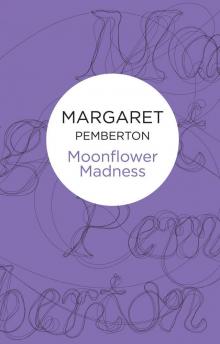 Moonflower Madness
Moonflower Madness The Londoners
The Londoners The Flower Garden
The Flower Garden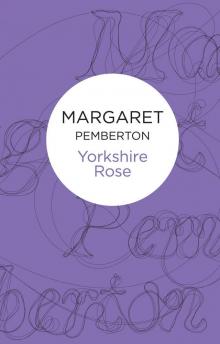 Yorkshire Rose
Yorkshire Rose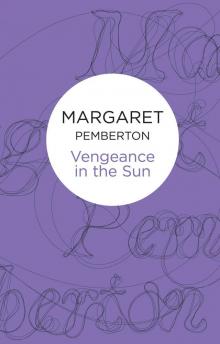 Vengeance in the Sun
Vengeance in the Sun Zadruga
Zadruga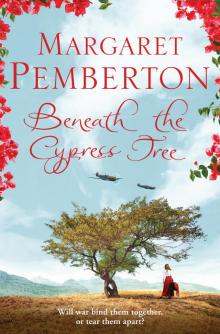 Beneath the Cypress Tree
Beneath the Cypress Tree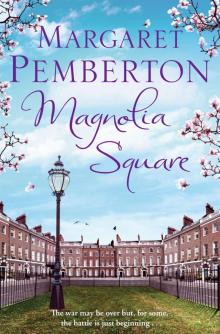 Magnolia Square
Magnolia Square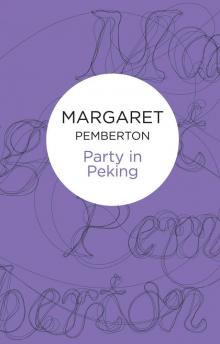 Party in Peking
Party in Peking Lion of Languedoc
Lion of Languedoc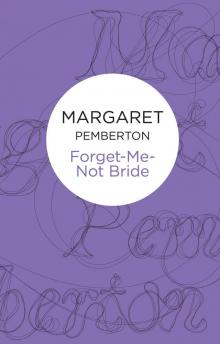 Forget-Me-Not Bride
Forget-Me-Not Bride The Guilty Secret
The Guilty Secret Rendezvous With Danger
Rendezvous With Danger A Season of Secrets
A Season of Secrets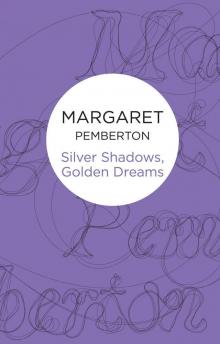 Silver Shadows, Golden Dreams
Silver Shadows, Golden Dreams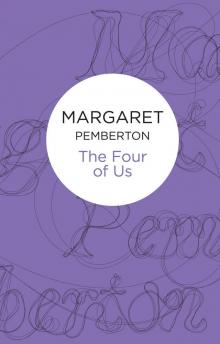 The Four of Us
The Four of Us Devil's Palace
Devil's Palace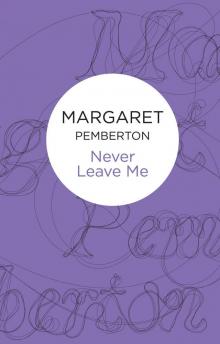 Never Leave Me
Never Leave Me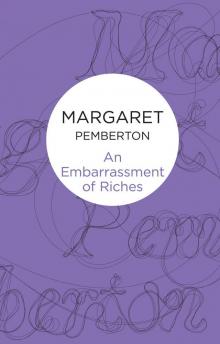 An Embarrassment of Riches
An Embarrassment of Riches African Enchantment
African Enchantment White Christmas in Saigon
White Christmas in Saigon Coronation Summer
Coronation Summer A Multitude of Sins
A Multitude of Sins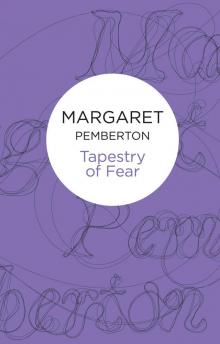 Tapestry of Fear
Tapestry of Fear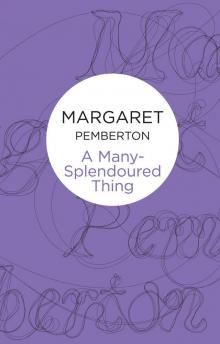 A Many-Splendoured Thing
A Many-Splendoured Thing